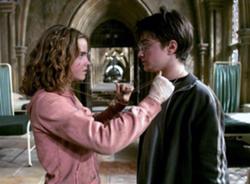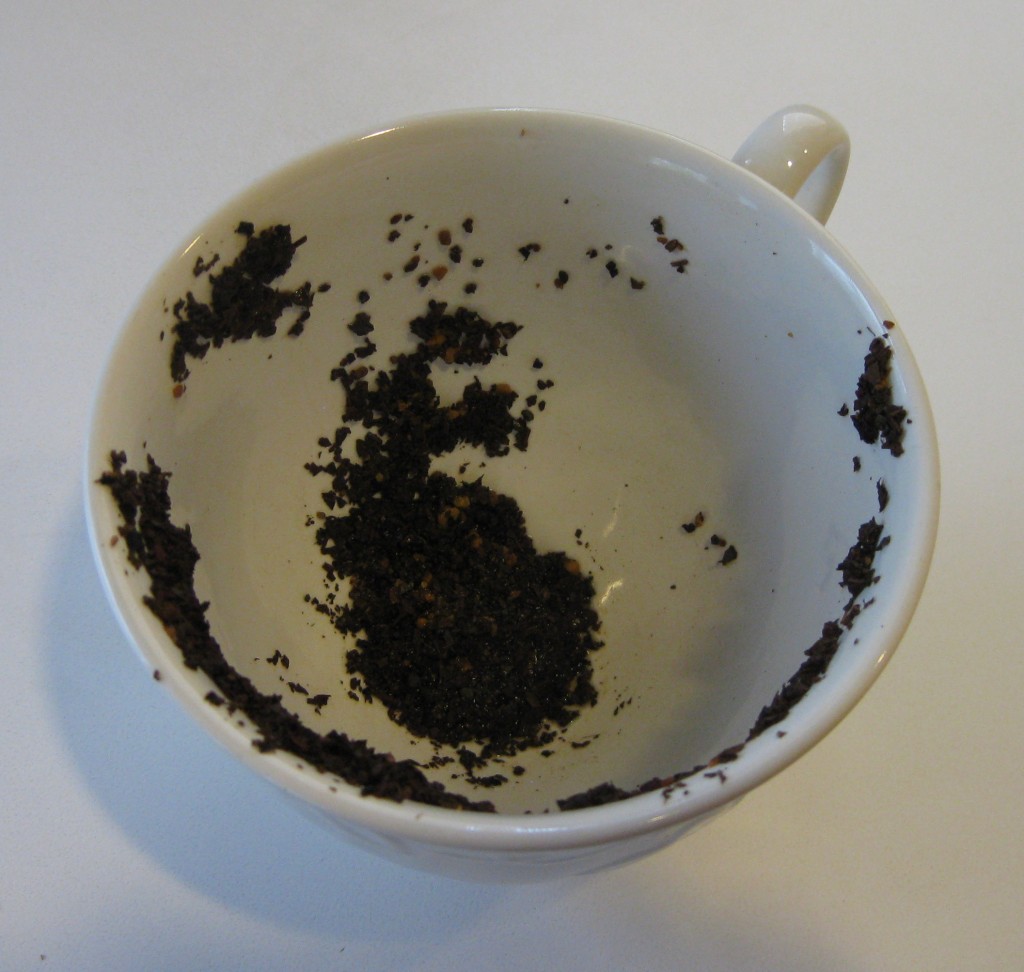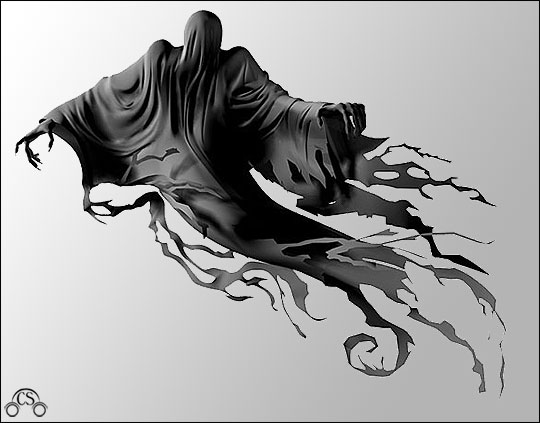 I finished [amazon_link id=”0439136369″ target=”_blank” ]Harry Potter and the Prisoner of Azkaban[/amazon_link] this evening. This post covers the last seven chapters, as it didn’t seem like a good idea to stop at chapter 20 and just write a separate post for the last two.
I finished [amazon_link id=”0439136369″ target=”_blank” ]Harry Potter and the Prisoner of Azkaban[/amazon_link] this evening. This post covers the last seven chapters, as it didn’t seem like a good idea to stop at chapter 20 and just write a separate post for the last two.
Chapter 16, “Professor Trelawney’s Prediction,” has all the Hogwarts students preparing for their exams, including Fred and George, who will be sitting their O.W.L.’s, and Percy, who is taking the N.E.W.T.’s. Lupin gives a completely practical final exam—it’s easily the most authentic assessment Harry ever takes, and this exam is one of the reasons I approve of Lupin so highly as a teacher. He asks the students to perform in a real-world situation and apply what they have learned throughout the year in his class to that situation. It is interesting to see Hermione completely lose it with the Boggart, and as it turns out, Ron was pretty close when he joked earlier that Hermione’s Boggart would have been a piece of homework that only received a 9 out of 10. No, instead, it was Professor McGonagall telling her she had failed everything. It’s interesting how Hermione becomes upset by something so completely irrational. There is no way Hermione would fail even one class, let alone them all, and if she had been able to put her rational mind to good use during the exam, she might have remembered that and been able to use it against the Boggart.
Later, Harry takes his Divination exam, which consists of looking into the crystal ball. He tells Trelawney he sees Buckbeak flying away, escaping his execution. Professor Trelawney dismisses his “prediction,” but it turns out to be true. Then she is somehow possessed and delivers what Dumbledore calls her second real prediction. It’s only chance that Harry was still there to hear her. I wonder if seers can deliver predictions when they are alone, or if another witch or wizard must be there to hear it? That makes more sense to me because otherwise tons of prophecies might be lost.
During Chapter 17, “Cat, Rat, and Dog,” the truth about Sirius is revealed, but before Harry learns it, he makes a move to kill Black. A voice in his head says, “Do it now!” I wonder if that is the horcrux? Lupin arrives, and Hermione tells the others he’s a werewolf. By the end of the chapter, we learn also that Ron’s rat Scabbers is also an animagus by the name of Peter Pettigrew. Now I have to ask the question we’re all wondering about: all those times that Fred, George, and even Harry looked at the Marauder’s Map, and they never wondered what on earth Peter Pettigrew was doing with Ron? Come on. This is one instance in which I think the film gets it right because Harry notices Pettigrew on the map and says something about it to Lupin.
I also wonder about animagi. Is it possible to choose which animal you become, or is the animal a reflection of your personality in some way? I mean, Pettigrew is pretty rat-like, but you wouldn’t think he would choose to become a rat. Not really all that noble an animal, after all. I lean toward the belief that you cannot choose your animagus form, as J.K. Rowling was once asked about it, and she said she would like to turn into an otter, but suspects that she’d turn into “a guinea pig or something, which would be quite embarrassing.” However, it would seem that wizards have a little more control over the form their Patronus takes, as Snape and Tonks both create Patronuses that mimic the form of the person whom they love most.
In Chapter 18, “Moony, Wormtail, Padfoot, and Prongs,” I noticed another strange possible oversight when Lupin discusses how he was bitten and became a werewolf as a small boy, but “in those days there was no cure.” Well, there still isn’t, right? I mean, the Wolfsbane Potion makes it easier, but Lupin still transforms. He’s just gentler and more docile. If there were a cure, then folks wouldn’t be as terrified of Fenrir Greyback, and there wouldn’t have been the fear that Bill would become a werewolf when he’s bitten later. After all, if there were a cure, it would simply be administered, right? I think Rowling probably meant to refer to the Wolfsbane Potion and perhaps meant “treatment,” rather than “cure,” but there it is in print, so it’s a question.
Another interesting comment later on when Lupin says, “I doubt whether any Hogwarts students ever found out more about the Hogwarts grounds and Hogsmeade than we did,” but the fact remains that the Chamber of Secrets and possibly the Room of Requirement were unknown to them. It stands to reason that as none of them were Parselmouths like Harry, they never discovered the Chamber of Secrets, which in any case was widely believed to be legendary. The Room of Requirement is probably Unplottable, and the Marauders were likely unable to include it on the map if they knew about it, which brings up another point. Hogwarts itself is Unplottable. So how was this map made? Is it possible because it was made at Hogwarts and depicts Hogwarts rather than directions to Hogwarts from, say, Little Whinging or Godric’s Hollow or somewhere else?
Another thing that has always bothered me about this chapter is the way that Sirius and Remus each admit suspecting each other of being Voldemort’s spy. In Lupin’s case, all the evidence seemed to point to Sirius, but why would Sirius suspect Remus? Was it a bit of latent werewolf prejudice? I imagine that would be hard to shake.
Lupin also ascribes Snape’s hatred of James to his jealousy “of James’s talent on the Quidditch pitch.” Obviously, Lupin doesn’t know Snape very well, and he never suspected that Snape’s hatred was based on Snape’s feelings for Lily. However, Lupin very carefully does not bring up all the bullying that went on. He is embarrassed about it now, clearly, and we see that later when he admits as much to Harry when Harry discovers the Marauders bullied Snape.
In Chapter 19, “The Servant of Lord Voldemort,” Snape has arrived and reminded us all that Lupin has not taken his Wolfsbane Potion tonight (cue ominous music). This scene is really well played in the movie, particularly by Alan Rickman (as always) and Gary Oldman. The trio gets a little overexcited and knocks Snape out, and we learn that Harry’s hunch about Crookshanks is right. He has been helping Sirius Black. He’s part-Kneazle, which is how he knew that Sirius was not really a dog. He is a sort of furry Sneakoscope and is able to ferret out untrustworthy folks, too.
So Pettigrew has been living as a rat for the last 12 years. Do you think ever transformed into himself, even once, during that time he lived with the Weasleys? We also learn that he has done it because he’s dead scared of Voldemort’s old supporters, and he chose a wizard family to live with so he could keep an ear out for any news. So how much human thought are animagi capable of? Sirius mentions that he thinks the Dementors perceived his thoughts were less complex as a dog, but that they probably thought he was losing his mind. So how does a wizard transform himself back into a human, then? He must retain much more of a human mind than Sirius seems to indicate, or he’d not be able to do it, right?
And finally, my last question before I move on to the next chapter. How on earth does Peter Pettigrew get sorted into Gryffindor? He sold out James and Lily rather than dying, as Sirius or James would have done for him. He never shows even a modicum of bravery, not one single time. He should have been place in Slytherin or Hufflepuff. So what’s up with that? Pettigrew is not like Neville, who truly is brave but needs to grow into his confidence. Pettigrew never becomes brave. He dies a coward.
In chapter 20, “The Dementor’s Kiss,” Harry accomplishes a first that no one much remarks upon. We learn in the next book that Harry is the only known survivor of the killing curse, but he is apparently also the only known person to see what’s under a Dementor’s hood who “survives.” Remember that he asked Lupin about it, and Lupin said that the only people who knew were in no shape to tell anyone else. But Harry sees it as the Dementor prepares to suck out his soul; however, his Patronus knocks the Dementor away and saves him. Interesting. No one ever mentions it in the long list of Harry’s exceptionalities.
In chapter 21, “Hermione’s Secret,” Ron is still knocked out by whatever spell Pettigrew used on him. What do you think it was, for the record? A particularly powerful stunning spell? The book only describes a bang and a burst of light, but it doesn’t say what color. Stunning spells expel jets of red light.
We finally learn how Hermione has been able to get to all her lessons, and I must say, I have big problems with the Time-Turner. I do not understand why the Ministry would allow a 13-year-old witch to have such a device and trust she was only going to use it for classes. Update, 8/4/13: Now that the last chapters of Azkaban have been revealed on Pottermore, Rowling has shared she, too, found she was in a bit of a bind with the Time-Turner. I’ll put in-line updates where Pottermore has answered a question I had.
I know that Hermione explains that she had to make all kinds of assurances, and all kinds of special permissions were needed before she could have it, but I mean, really. I think the school should have told Hermione to suck it up, you can’t take every single class, so make a choice. I don’t care how responsible she is. And then Dumbledore encourages her to use it to change time? I mean, I agree with him and all, but why, for instance, don’t wizards use these magical undo devices for everything then? I know it would be a bad idea, but you can’t tell me Dumbledore wouldn’t go back and save Ariana. There is a lot of pain in life, and if there was a device you could use to go back in time and alter it and prevent it from happening—well, those devices wouldn’t be safe. Everyone would want one, and there’s no way that the Ministry would give one to a 13-year-old girl. This, to me, strains credulity. Hermione explains that “We’re breaking one of the most important wizarding laws! Nobody’s supposed to change time, nobody!” So perhaps one might go to Azkaban for changing time. But here’s the problem: how does one prove time was changed? Even Harry has to be prevented from changing the timeline several times that evening (in addition to the way he is already changing it). The alternate timeline would now be the timeline, right? I like the results, but I think Time-Turners are one of those aspects of the books that is not particularly well thought out.
Update, 8/4/13: As it turns out, wizards have wreaked havoc on time. The longest period of time that may be relived using a Time-Turner without causing damage to the witch or wizard using it is five hours. Witches and wizards who have attempted to go back further have most often died. Pottermore shares the interesting tale of Eloise Mintumble, who traveled back in time from 1899 to 1402. She was stuck there for five days, and when she returned to 1899, her body aged five centuries, and she died. While she lived in the past, she changed the course of history so drastically that 25 people were simply not born because of the alteration that interacting with Eloise had wrought upon the lives of the ancestors of these 25 people.
Harry conjures his Patronus and saves Sirius, Hermione, and himself from the Dementors. As Hermione notes, this is really advanced magic, and well beyond the abilities of some fully-qualified wizards. Harry’s performance in his third year is a strong predictor of his abilities in Defense Against the Dark Arts. Many DA members believe Harry to be their best DADA teacher, and if Harry had wanted to go into education, I’m sure he would have had an excellent career as DADA professor. At any rate, Hermione and Harry rescue Sirius and send him on his way aboard Buckbeak.
In the final chapter, “Owl Post Again,” Dumbledore says to Snape, “Unless you are suggesting that Harry and Hermione are able to be in two places at once, I’m afraid I don’t see any point in troubling them further.” But wouldn’t Snape know about Hermione’s Time-Turner? I mean, even if it were kept secret, the professors are bound to notice Hermione never misses her classes, even when they are scheduled at the same time. It stands to reason that there is no conflict with Potions, so perhaps Snape was not in the know, but still. And even if Snape doesn’t know, Fudge probably does. He’s the Minister for Magic. Of course, knowing who has Time-Turners might be a matter for an underling to worry about, but with Sirius Black on the loose, one would think Fudge himself would be keeping a closer eye on Time-Turners. Except he’s incompetent, so there’s that. I don’t know. Like I said, the whole thing troubles me.
In this very chapter, Dumbledore even says, “The consequences of our actions are always so complicated, so diverse, that predicting the future is a very difficult business indeed.” Which is exactly why 13-year-olds should not be handed Time-Turners!
Even more astonishingly, giving Time-Turners to Hogwarts students may not even be all that rare, as Bill and Percy Weasley and Barty Crouch, Jr. are all known to have achieved 12 O.W.L.’s—a feat which may only be possible with a Time-Turner. (Unless some other options for scheduling existed for them.)
Update, 8/4/13: It would seem Hermione Granger is the only known Hogwarts student to use a Time-Turner. Rowling said, “I had Hermione give back the only Time-Turner ever to enter Hogwarts.” Bill, Percy, and Barty, Jr. must have found other means to achieve their 12 O.W.L.’s.
If you start wondering whether or not people age when they use the Time-Turner and start adding up all the additional hours Hermione has lived over the course of the year, then you will truly go nuts. Update, 8/4/13: Pottermore doesn’t say whether or not there were lasting ill-effects from Hermione’s use of the Time-Turner this year.
At any rate, Dumbledore says some wise stuff about how Pettigrew is now in Harry’s debt, and that is all very complicated. He also mentions that Harry looks “extraordinarily like James. Except for your eyes… you have your mother’s eyes.” Which is really important and is repeated a lot for good reasons. Then Dumbledore says, “You think the dead we have loved ever truly leave us? You think that we don’t recall them more clearly than ever in times of great trouble?” And of course, this seems absolutely prophetic when Harry uses the Resurrection Stone to recall his parents, Lupin, and Sirius to help him face his own death. And it has been a while since I read [amazon_link id=”0545139708″ target=”_blank” ]Harry Potter and the Deathly Hallows[/amazon_link], but I saw the movie recently, and in the movie, Sirius says that Voldemort will not be able to see them because they are in Harry’s heart. I always cry at that part. Anyway, I will be interested to see if that shows up in the novel, too. My memory on that book is not as ironclad because I haven’t read it as many times.
Before I close, I just have to say I’m not sure how I feel about Charity Burbage as a teacher. We only really see her when Voldemort kills her, but she is probably Hermione’s Muggle Studies teacher, since she was the teacher four years later (unless some change of staffing took place, which is possible). At any rate, how does Hermione manage to score 320% on an exam? Only on a bogus exam, that’s how. That is way too much extra credit.
Harry heads home to Privet Drive with a signed Hogsmeade permission form and the threat of a mad murderer to use against the Dursleys. Life, at least for a little while (sadly) is good.
Now it’s on to [amazon_link id=”0439139600″ target=”_blank” ]Harry Potter And The Goblet Of Fire[/amazon_link].
Movie still via the Harry Potter Wiki.


